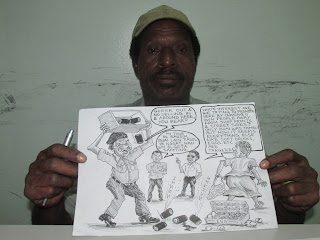 |
| Papua New Guinea Prime Minister Peter O'Niel showing his completed NID Form |
By FIDELIS SUKINA
Papua New Guinea’s National Identity Project (NID project) is
a great initiative but lacks the capacity to move forward.
With the date set for November to get the residents of Port
Moresby registered it seems a big task.
Yes we got a new building opened early this year fitted with
air corn and all the luxuries, I wonder if those people who sit there in those
offices know the task ahead.
They have billboards. TV and Radio commercials, newspaper advertisements,
heck they got all aspects of mass media covered but it’s just promoting the
card itself and the benefits.
No real awareness on the information needed to acquire a NID
card, I went with my media colleges and we ended up looking for ways to acquire
information.
Key information like, where your parents currently reside could not be answered by some because their parents are deceased, the women left to help us fill in the forms
said we had to fill in the areas where it had asterix (*) which if not filled would be rejected by the
system hence leading to your card not being processed.
What a joke, and things like clan and tribe names, wards and
LLGs, some of our colleagues didn’t know what clan let alone tribe they
belonged to and it had asterix on the side which needs to be filled.
 |
| Prime Minster Peter O'Niel cuts the ribbon to launch the NID project in his home province as Planning Minister Charles Able looks on |
You also had to put down your parents clan and tribe names
some don’t even know their father or mother how you expect them to know their
clan and Tribe.
What about the old people there was a section which asked
were you born before or after marriage and the other asked when your parents
date of marriage do they know the date of marriage for their parents, some
older citizens can’t recall these things because their parents were left in the
village and they came and lived elsewhere and can’t recall their parents’
marriage dates some parents never even got married.
She probably thought it was easy for us to go back home and
fill in the forms and come back, imagine the fourth or fifth generations of
Papua New Guineas in urban areas who have no idea what so ever on their tribes
and clans, some street kids who sell on the streets don’t even know their
parents, and yet this people ask us to look for information, the question is
where are we going to acquire these information? Lord help us is what some
would say because only God knows who their parents are where they are from and
what clan they belong to.
For those women married your NID card will be issued under
your maiden name, well some women don’t agree and some husbands don’t even
agree with that saying when you are married you use your husband’s name, women
present said it would conflict with their passports their account names and
other things registered with their husband’s surname.
Is it necessary? That we struggle when we have a government
that should know all the tribes clans and wards LLGs of this country they
should give us a book with all these information to help us fill in the forms.
The Civil Registry office is a joke no email no phone lines
no proper data entry system some people even have multiple birth certificates
printed because they had filled in two forms the system can’t even figure out
that this person has already been issued a Birth Certificate.
The simple fact is that before we moved to this project we
should have upgraded our civil registry so that information gathered there
could help in creating books or sheets with clan and tribe names so we have a
reference to figure out our own tribes and clans.
People who have already received birth certificates are told
to bring in their copies and if misplaced or without them will have to fill in
the same forms again.
If I had filled up the same forms for the Birth Certificate
why should I be given another form to fill in, just type my name in the data
base and see my details my clan my tribe
whatever that is needed and give me my card.
But that is a dream right, no data base system, and just
because they are lazy they can’t get your information they charge re print fees
and finding fees, a Government service provider charging finder fees and
reprint fees what a lazy service provider.
What about the Papua New Guineas who don’t have birth
certificates they should be given priority and helped to acquire the
information needed for the NID card, make things easy for the old and the young
generation so they can have an identity, as a human being identity is
important, rolling out new offices of NID and not even updating the system, creating
awareness is a scramble with looming
problems ahead.












